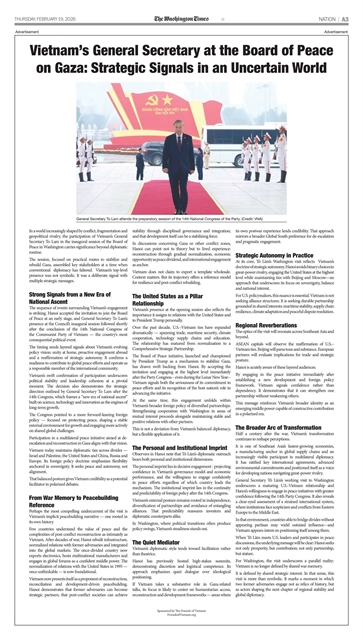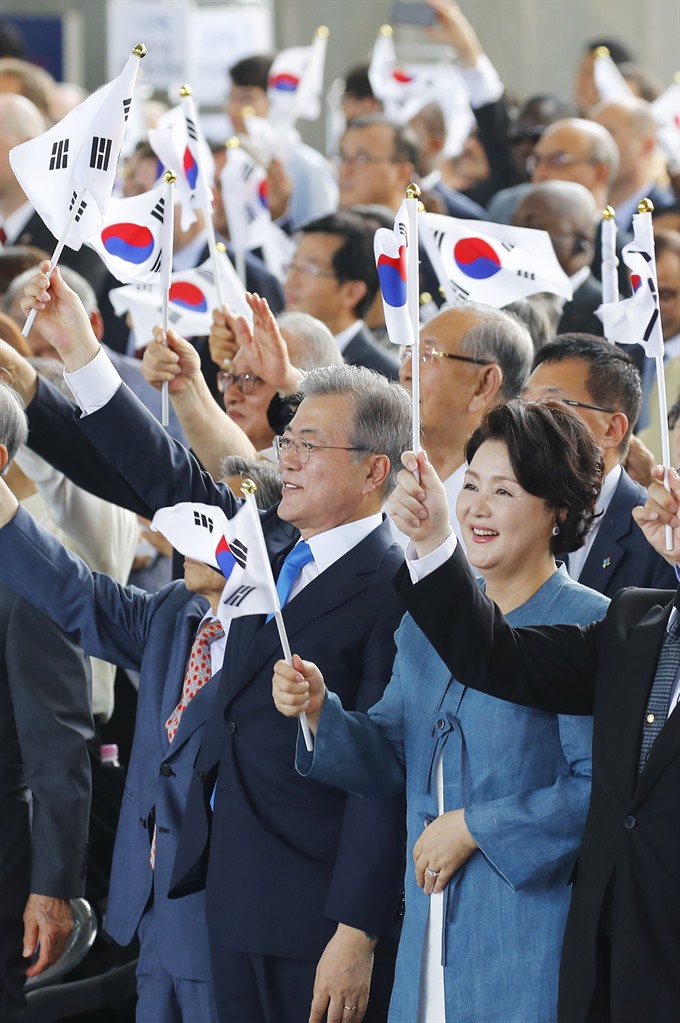 World
World

President Moon Jae-in on Wednesday used his Liberation Day address to pitch his Korea peace drive, calling for railway, energy and economic cooperation with the North as a cornerstone for Northeast Asian peace and prosperity.
 |
| President Moon Jae-in (L) and first lady Kim Jung-sook wave the South Korean national flag during a ceremony commemorating the 73rd Liberation Day in Seoul on August 15, 2018. — YONHAP Photo |
SEOUL — President Moon Jae-in on Wednesday used his Liberation Day address to pitch his Korea peace drive, calling for railway, energy and economic cooperation with the North as a cornerstone for Northeast Asian peace and prosperity.
Speaking at a ceremony marking Korea’s independence from the 1910-45 Japanese colonial rule 73 years ago on the day, he renewed his commitment to end the division of the Koreas, saying "true liberation" can only be achieved when the two countries establish a lasting peace and economic community.
"We must overcome such a division for our survival and development. Even though a political unification may be a long way from here, establishing peace between the South and the North and freely visiting each other, and forming a joint economic community is true liberation to us," Moon added in a nationally televised speech that also marked the foundation of the South Korean government 70 years ago on Wednesday.
Moon insisted the two Koreas were already moving toward peace, noting the countries have halted their hostile acts under an agreement reached at his first-ever summit with North Korean leader Kim Jong-un held April 27.
South and North Koreas technically remain at war as the 1950-53 Korean War ended with an armistice, not a peace treaty.
"North Korea-US summit too has been successfully held on the strong determination of the North and the US to move toward peace and prosperity," the president said referring to the historic summit between US President Donald Trump and the North Korean leader held in Singapore on June 12.
"Peace and prosperity on the Korean Peninsula is a promise the two leaders made to the rest of the world. I hope North Korea’s complete denuclearisation and the United States’ corresponding measures will be swiftly pursued," Moon added.
He also vowed efforts to improve his country’s own ties with the North, noting he will soon travel to Pyongyang for what would be his third bilateral summit with the North Korean leader. Moon and Kim held their second meeting at the border village of Panmunjom on May 26.
"The development of South-North Korean relations is not an additional outcome of development in North Korea-US ties. Rather, the development of South-North Korean relations is the driving force that promotes denuclearisation of the Korean Peninsula," Moon said.
To this end, South Korea will seek to physically connect its roads and railways with those of North Korea before the year’s end, the president said.
Noting the European Union began with a simple bloc for coal and steel, the South Korean president proposed the two Koreas, together with the United States and four other Asian countries, form what he called a "Northeast Asian railroad community."
The presidential office Cheong Wa Dae later explained the four Asian countries were China, Japan, Russia and Mongolia.
"This community will lead to an energy bloc and economic bloc in Northeast Asia by expanding our economic area to the northern continent and becoming the foundation of co-existence and prosperity in Northeast Asia," the president said. "And this will mark the start to a multilateral security system in Northeast Asia."
Moon also stressed the need to resume and expand economic cooperation between the two Koreas.
"According to a study by a state-run think tank, the economic impact of economic cooperation between the South and the North is expected to reach 170 trillion won (US$150 billion) over the next 30 years," the president said.
However, the president said inter-Korean cooperation may take off in earnest only after the North completely denuclearises.
"Economic cooperation can really take off when peace is established on the Korean Peninsula, along with its complete denuclearisation. Our economy may take a new leap when we realise the goal of forming a peaceful economic community," he said.
Once peace is established on the Korean Peninsula, the country will create at least two new special economic zones near the inter-Korean border in Gyeonggi and Gangwon provinces, the president added.
"Peace and prosperity of the Korean Peninsula depends on what we do. I believe in the power of optimism. The determination and courage that led to the country’s liberation will again take us over the current division and bring us true liberation of peace and prosperity," Moon said. — YONHAP